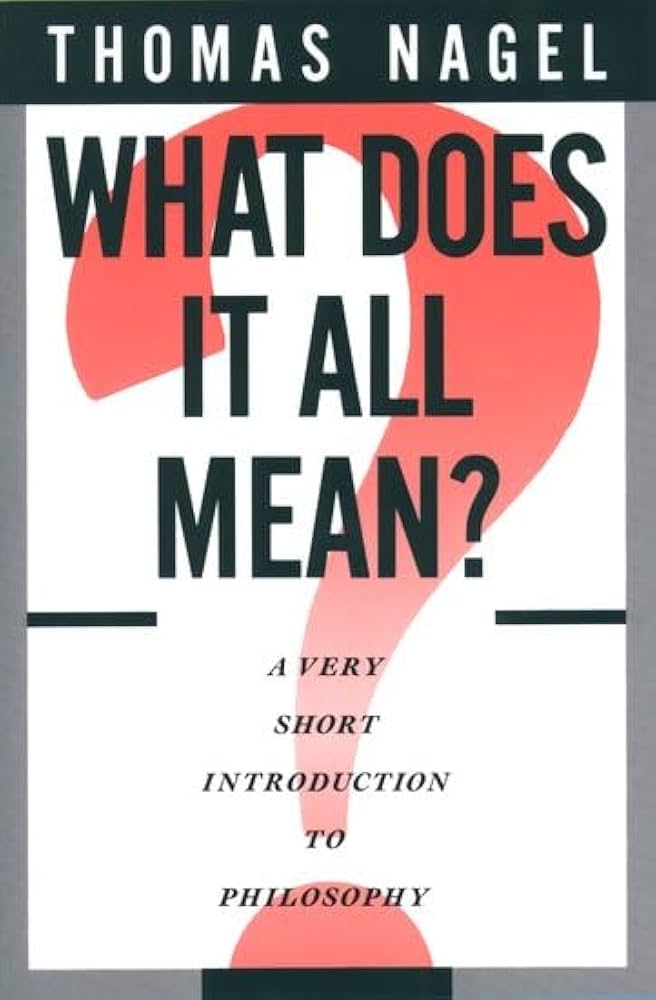Table of Contents
A Short Book with Big Questions
Thomas Nagel’s What Does It All Mean? (1987) may be brief—just under 120 pages—but its ambition is anything but modest. Written as an accessible introduction to philosophical thinking, the book offers a concise, clear, and powerful journey through some of the deepest perennial questions: What can we know? What is the mind? Do we have free will? What makes life meaningful?
Nagel, a distinguished analytic philosopher known for rigor and clarity, takes a direct, Socratic approach. Rather than providing definitive answers, he invites readers to think carefully and critically, using everyday language and accessible scenarios. This is not “philosophy lite”—it’s distilled philosophy, clear enough for a teenager and deep enough for a lifelong student of thought.
Overview: Nine Big Questions
The book is structured around nine core chapters, each framed as a question:
- How Do We Know Anything?
A classic epistemological puzzle. Nagel begins by probing skepticism: if our senses can deceive us, how can we ever truly know anything about the world? - Other Minds
Can we be sure that other people (or animals, or even machines) are conscious? This chapter introduces the philosophical problem of other minds—simple, yet persistently unresolved. - The Mind–Body Problem
What is the relationship between the physical brain and subjective experience? Here Nagel revisits themes from his famous paper “What Is It Like to Be a Bat?”, exploring the limits of reductionism. - The Meaning of Words
What do words mean, and how do they refer to things in the world? This chapter hints at problems explored more formally by figures like Wittgenstein and Kripke. - Free Will
Do we really make choices, or are all events—including our decisions—determined by prior causes? Nagel presents the conflict between determinism and moral responsibility in plain terms. - Right and Wrong
Is morality objective or relative? Nagel outlines competing ethical theories—utilitarianism, Kantianism, and moral subjectivism—without pushing a final answer. - Justice
What makes a society just? The discussion includes fairness, equality, and individual rights, echoing themes from John Rawls while remaining broadly accessible. - Death
What happens when we die—and does that change how we should live? A sensitive chapter that brings existential concerns to the philosophical table. - The Meaning of Life
Is life meaningful, or is that just a human illusion? Nagel considers religious, nihilistic, and secular perspectives without forcing conclusions.
Each chapter acts as a prompt—an invitation to reflection rather than a lecture.
Style and Accessibility
Nagel’s prose is a model of philosophical clarity. He avoids jargon, breaks down arguments into everyday terms, and uses relatable examples. For instance, he uses the idea of being a brain in a vat, or seeing colors differently, to get readers thinking about subjectivity and perception.
Importantly, Nagel does not dumb down the content. Instead, he respects the reader’s capacity for thought, treating even complex problems with intellectual honesty and humility. His tone is inviting but rigorous—ideal for students, newcomers, or anyone looking to re-engage with fundamental ideas.
Strengths: Clarity, Honesty, and Depth
1. Clarity Without Oversimplification
Nagel’s greatest strength here is pedagogical. He shows that philosophy can be practiced without technical language, and that anyone can do it—provided they’re willing to slow down and reflect carefully.
2. Philosophical Humility
Nagel doesn’t pretend to have all the answers. His style models philosophical humility—pointing out that the point of philosophy is not to conclude quickly but to think better.
3. Breadth of Scope
Covering nine timeless problems in under 120 pages is no small feat. Yet each chapter touches real depth—providing a foundation that can launch further reading into Descartes, Hume, Kant, or even modern thinkers like Parfit or Dennett.
Limitations and Critique
For advanced readers or professional philosophers, What Does It All Mean? may feel too introductory. It lacks footnotes, references, and formal argumentation. But that’s not the point. This is not a scholarly tome—it’s a conceptual invitation.
A more serious critique might be that Nagel’s secular tone assumes a degree of philosophical naturalism. Religious or mystical readers might find the treatment of meaning or death lacking in spiritual nuance. Yet even they might benefit from the clarity of his framing.
Who Should Read This?
- Beginners: A superb introduction to philosophical questions for high school or early college students.
- Teachers and Parents: A perfect text to spark discussion or homeschool debate.
- Lapsed Thinkers: Anyone who once loved philosophy and wants to rekindle that spark.
- Writers and Creatives: Those seeking clarity in their own thought or deeper existential grounding.
Nagel’s work reminds us that philosophy is not an academic exercise—it’s a living, personal endeavor.
Contemporary Relevance
In a world saturated with noise, distraction, and surface-level answers, What Does It All Mean? reclaims the value of asking basic, inconvenient, necessary questions. It’s a tonic for the intellectually weary—a call to wonder, doubt, and deeper understanding.
In education, where critical thinking is often reduced to technique, Nagel’s book restores its philosophical soul.
TL;DR
What Does It All Mean? is a quiet masterpiece—unpretentious, disarming, and intellectually sincere. It doesn’t try to convert or convince, but it does something rarer: it opens the door. For many, this book may be the first step on a lifelong philosophical journey.
Highly recommended as a foundational text for your philosophical library—one that speaks not to the expert, but to the human being who still dares to ask, “Why?”

Leave a Reply